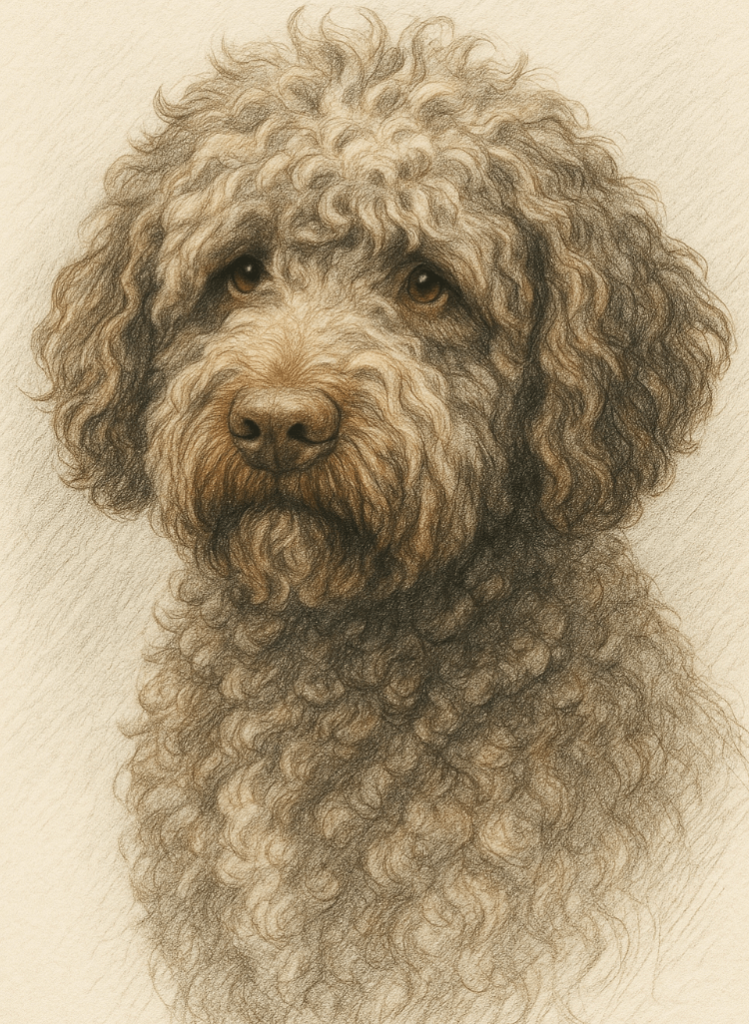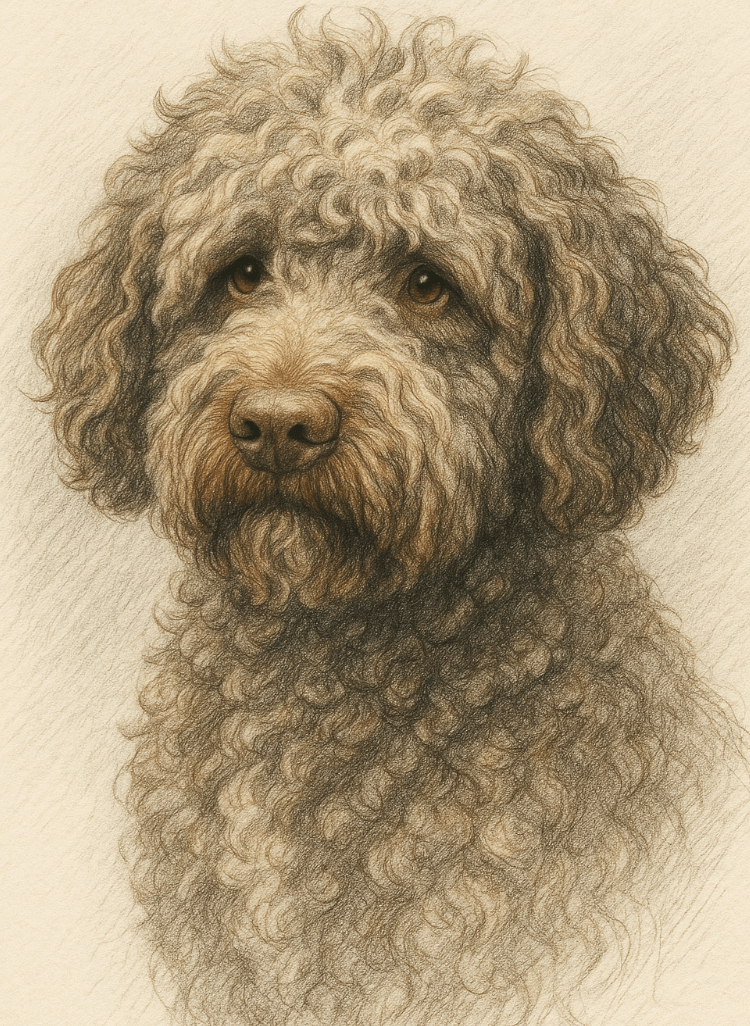Discover the French Water Dog: A Loyal and Energetic Companion
The French Water Dog, also known as the Barbet, is a remarkable breed that combines charm, intelligence, and versatility. Originating from France, this medium-sized dog has been prized for centuries as both a working companion and a loving family pet. With their curly, water-resistant coat and boundless energy, French Water Dogs excel in various roles, from retrieving game in marshlands to participating in modern-day canine sports.
But beyond their impressive skills, these dogs are cherished for their affectionate nature and strong bond with their human families. In this blog post, we’ll explore everything you need to know about the French Water Dog, from their history and temperament to grooming tips and training advice.
Key Characteristics of the French Water Dog
The French Water Dog stands out for its unique combination of physical traits and personality quirks. These characteristics make them an ideal choice for active individuals or families who can meet their needs.
Distinctive Curly Coat:
Their dense, woolly coat is hypoallergenic and water-resistant, making them excellent swimmers and suitable for allergy sufferers.Medium Size and Sturdy Build:
Standing between 20 to 25 inches tall and weighing 35 to 65 pounds, they are robust yet agile, built for endurance and strength.Playful and Energetic Nature:
French Water Dogs thrive on activity and love outdoor adventures, whether it’s hiking, swimming, or playing fetch.Highly Intelligent and Trainable:
Known for their sharp minds, they quickly pick up commands and enjoy mental challenges, making them great candidates for obedience training.Affectionate and Loyal:
They form deep bonds with their families and are known for their gentle, friendly demeanor, especially with children.
These traits highlight why the French Water Dog is such a versatile and beloved breed, capable of adapting to various lifestyles while remaining a devoted companion.
How to Care for Your French Water Dog
Caring for a French Water Dog requires attention to their grooming, exercise, and dietary needs. Proper care ensures they remain healthy, happy, and well-adjusted members of your household.
Regular Grooming Sessions:
Their curly coat requires frequent brushing to prevent matting and tangling, ideally several times a week.Professional Trimming:
Occasional trips to a groomer can help maintain their coat’s shape and manage shedding.Daily Exercise Routine:
Aim for at least one to two hours of physical activity daily, including walks, runs, or interactive play sessions.Balanced Diet:
Feed them high-quality dog food tailored to their age, size, and activity level to support their energy demands.Mental Stimulation:
Incorporate puzzle toys, agility training, or scent games to keep their intelligent minds engaged and prevent boredom.
By providing consistent care and attention, you’ll ensure your French Water Dog remains a joyful and balanced companion.
Check this guide 👉Portuguese Water Dogs: Best 7 Expert Tips!
Check this guide 👉Spanish Water Dog: Best 7 Expert Tips!
Check this guide 👉Is Ice Water Bad for Dogs? Best 7 Expert Tips!

Pros of Owning a French Water Dog | Cons of Owning a French Water Dog |
|---|---|
Hypoallergenic coat | Requires extensive grooming |
Highly intelligent and trainable | Needs lots of exercise and mental stimulation |
Loyal and affectionate | Can be prone to separation anxiety |
Great with children and other pets | Not ideal for sedentary lifestyles |
Versatile in activities (swimming, agility) | May bark excessively if not properly trained |
Training Tips for Your French Water Dog
Training a French Water Dog is a rewarding experience, thanks to their eagerness to please and quick learning abilities. Follow these tips to set them up for success.
Start Early:
Begin training and socialization during puppyhood to establish good habits and prevent behavioral issues later on.Use Positive Reinforcement:
Reward desired behaviors with treats, praise, or toys to encourage repetition and build trust.Keep Sessions Short and Fun:
Aim for 10-15 minute sessions to hold their attention and maintain enthusiasm.Focus on Recall Training:
Teach a reliable “come” command, as their curious nature may lead them to wander off during outdoor adventures.Channel Their Energy into Activities:
Enroll them in dog sports like agility, dock diving, or obedience trials to harness their athleticism and intelligence.
With patience and consistency, training will strengthen your bond and bring out the best in your French Water Dog.
Health Considerations for French Water Dogs
While generally healthy, French Water Dogs are prone to certain genetic conditions and health concerns. Being aware of these issues allows you to take preventive measures and provide timely care.
Hip Dysplasia:
This common joint condition can affect mobility; regular vet check-ups and maintaining a healthy weight can reduce risks.Ear Infections:
Their floppy ears trap moisture, increasing the likelihood of infections. Clean ears regularly after swimming or baths.Progressive Retinal Atrophy (PRA):
A hereditary eye disorder that can lead to vision loss; responsible breeding practices help minimize this risk.Allergies:
Some French Water Dogs may develop skin or food allergies; consult your vet for proper diagnosis and treatment.Gastric Torsion (Bloat):
Large meals and vigorous exercise immediately after eating can cause this life-threatening condition; feed smaller portions and monitor closely.
Proactive healthcare and routine vet visits ensure your French Water Dog lives a long, healthy life by your side.
Fun Facts About French Water Dogs
The French Water Dog has a rich history and fascinating traits that make them truly unique. Here are some interesting tidbits about this captivating breed.
Historical Roots:
The breed dates back to the 16th century and was originally bred to retrieve waterfowl from lakes and rivers.Name Origin:
The name “Barbet” comes from the French word “barbe,” meaning beard, due to their distinctive facial hair.Rare Breed Status:
Despite their growing popularity, French Water Dogs remain relatively rare outside of Europe.Versatile Skills:
Historically, they were used not only for hunting but also as guide dogs and military assistants.Celebrity Owners:
Several celebrities, including Jennifer Aniston, have owned French Water Dogs, boosting their profile worldwide.
These fun facts showcase the breed’s rich heritage and enduring appeal.
Common Misconceptions About French Water Dogs
Despite their growing popularity, there are misconceptions about French Water Dogs that deserve clarification.
They Are High-Maintenance:
While grooming is essential, many owners find the process therapeutic and enjoy bonding with their dogs during grooming sessions.They Only Suit Active Households:
Although energetic, they adapt well to less active homes if given sufficient mental stimulation through puzzles and toys.They Don’t Shed:
While they shed minimally compared to other breeds, no dog is entirely non-shedding.They’re Just Like Poodles:
While similar in appearance, French Water Dogs have distinct personalities and working styles.They’re Difficult to Train:
On the contrary, their intelligence and eagerness to please make them highly trainable with the right approach.
Understanding these truths helps dispel myths and highlights the breed’s true nature.
Activities That Bring Out the Best in French Water Dogs
French Water Dogs thrive when engaged in activities that cater to their natural instincts and talents. Here are some ideas to keep them entertained and fulfilled.
Swimming Adventures:
Take advantage of their love for water by organizing trips to safe swimming spots or joining dock-diving competitions.Agility Training:
Set up obstacle courses to challenge their physical and mental abilities while strengthening your bond.Obedience Competitions:
Channel their trainability into formal obedience events where they can showcase their skills.Scent Work Games:
Use their keen sense of smell to play hide-and-seek with treats or participate in nosework classes.Interactive Toys:
Puzzle feeders and treat-dispensing toys keep them occupied and mentally stimulated during downtime.
Engaging in these activities ensures your French Water Dog remains happy, healthy, and fully utilized.
Frequently Asked Questions About French Water Dogs
Are French Water Dogs good for first-time owners?
Yes, but only if owners are prepared for their high energy levels and grooming needs.
Do they get along with other pets?
Absolutely! They are typically sociable and enjoy the company of other animals.
How much exercise do they need daily?
At least one to two hours of vigorous activity is recommended to keep them physically and mentally satisfied.
Can they live in apartments?
Yes, provided they receive adequate exercise and mental stimulation despite limited space.
What is their lifespan?
French Water Dogs typically live 12 to 14 years with proper care and nutrition.
Why the French Water Dog Could Be Your Perfect Companion
The French Water Dog is more than just a beautiful and intelligent breed—they are loyal, energetic, and endlessly charming companions who thrive when given love, attention, and purpose. Whether you’re looking for a partner for outdoor adventures, a playful family pet, or a competitive sport dog, this breed fits the bill beautifully. However, owning a French Water Dog comes with responsibilities, including regular grooming, plenty of exercise, and ongoing training. If you’re ready to invest time and effort into caring for this wonderful breed, you’ll be rewarded with a lifetime of devotion and joy.
Pemphigus Erythematosus in Cats: Best 7 Expert Tips! – Learn to recognize symptoms, manage flare-ups, and improve your cat’s quality of life.
Pemphigus Erythematosus in Dogs: Best 7 Expert Tips! – Discover causes, symptoms, and treatment options to manage this autoimmune skin condition effectively.
Cat Tympanic Membrane: Best 7 Expert Tips! – Learn how to protect your cat’s eardrum, spot issues early, and ensure lifelong auditory health.
Dog Tympanic Membrane: Best 7 Expert Tips! – Learn how to protect your dog’s eardrum, spot issues early, and ensure lifelong ear health with expert advice.





